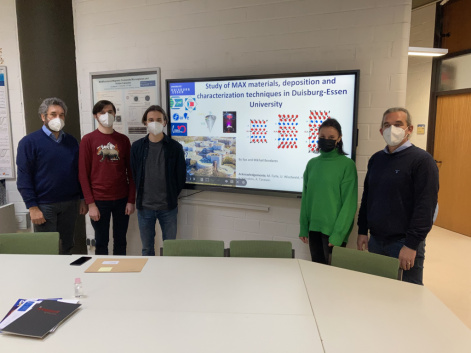Young physicists of FRC KSC SB RAS completed scientific training in Germany
17 December 2021 г.

A prerequisite for the mega-grant is the establishment of a youth scientific internship in the laboratory of a leading scientist, the project leader. Ilya and Mikhail Bondarev, young scientists of the laboratory of magnetic MAX materials at the L.V. Kirensky Institute of Physics SB RAS, which had created within the framework of the mega-grant, participated in the internship.
The two-month internship was organized at the Faculty of Physics of the University of Duisburg-Essen (UDE) and included training on a similar scientific equipment purchased at the expense of the mega-grant in the laboratory of UDE professor Michael Farle, who is one of the world's most famous specialists in the field of magnetism of ultrathin films and chairman of the "Magnetism" section in the German Physical Society.
With the active participation of Dr. Farle and other colleagues from Germany, the young scientists mastered the production of thin magnetic films by the method of pulsed laser deposition in an ultrahigh-vacuum facility, conducted studies of the electron-transport properties of synthesized thin-film MAX materials in a wide temperature range using a PPMS facility to study the physical properties of solids and nanostructures, and got acquainted with the application of ferromagnetic resonance and electron paramagnetic resonance to study the magnetic characteristics of MAX materials and basic principles of the Bruker EXEXSYS E 500 spectrometer.
The laboratory of magnetic MAX materials, as part of the mega-grant, launched an installation for sputtering thin films. Currently, this laboratory has already begun to grow magnetic MAX films. Therefore, one of the purposes of the trip was to study the experience of colleagues from Germany in this direction. The aim was also to get a general idea of MAX phases and experimental facilities at the University of Duisburg-Essen, to study the principles of synthesis systems, deposition parameters characteristic of MAX phases, to synthesize thin MAX films and, as an additional goal, to study low-temperature transport in a film of titanium oxynitride grown in the RSE laboratory of the Institute of Physics SB RAS.
As a result of the internship, young scientists presented a report. As Ilya Bondarev said, the potential application of MAX phases can vary from various protective coatings and electrical contacts to cooling systems, magnetic sensors and spintronics. The method of pulsed laser deposition (PLD) has its advantages (high deposition rates and accuracy of dosing of materials) and disadvantages (formation of large clusters of materials which negatively affect the homogeneity of the resulting films).
“We can say that during the internship, the basic principles of PLD and deposition of MAX films were mastered. With our participation, films of chromium-manganese-gallium-carbon were grown, the basic principles of operation of an EPR spectrometer were studied, and the transition to a superconducting state in the titanium oxynitride film was discovered, ” Ilya described the results of the internship.
The report caused a lively discussion among colleagues from the Institute of Physics SB RAS. .The sScientists discussed technological details and other aspects of the conducted experiments. After the report, Mikhail Bondarev noted: “It was very useful to work in Michael Farle's team. Interesting teamwork, close cooperation between people… We have seen how the technological process is going on. This is an experience which we can apply in our laboratory and share with our colleagues. Moreover, we are now starting to be increasingly engaged in this field. In 2023, another training course for technologists in Germany is planned in order to improve qualification in the field of synthesis of MAX-phases. "
Share:
